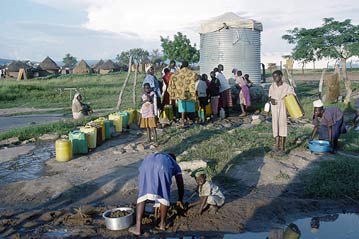Sudanese refugees from Uganda prepare to go home
Sudanese refugees from Uganda prepare to go home

KAMPALA, Uganda, April 26 (UNHCR) - A group of 13 Sudanese refugees from Uganda, including women, elders and young people, left this week for a "Go and See" visit to their home villages in Kajo Keji county, 30 kilometres from the Uganda-Sudan border.
The trip, which began Tuesday, follows a visit to Uganda last week by a Sudanese delegation from Kajo Keji County to encourage Sudanese refugees to return home now that the 21-year conflict in South Sudan has ended. A comprehensive peace agreement was signed in January 2005 by the Khartoum government and the Sudan People's Liberation Movement.
"We are ready to receive all our brothers and sisters who have found refuge in Uganda for so many years," Mula Oliva, the newly appointed Commissioner of Kajo Keji county told more than 400 refugees who gathered in Uganda's Kali refugee village last week to meet the delegation from South Sudan. Kali is 40 minutes by road from the Sudan border. "There is now peace in South Sudan and we need support of refugees to rebuild our country."
"The conditions are far from ideal," Oliva added, "but if there are no people in the villages, we cannot drill new boreholes, construct new schools and health centres and improve roads. Everybody is needed and everybody is welcomed home."
One refugee in the crowd responded: "This is the first time in 20 years that anyone from the Sudan has come to welcome us home."
The Sudanese "Come and Inform" delegation also included other South Sudan officials, tribal chiefs, elders and students. The visit was organized as part of UNHCR's preparations for the upcoming first repatriation of Sudanese refugees in Uganda to South Sudan. The visit enabled the refugees to ask questions and raise their concerns about what to expect in their homeland so they can make a voluntary and informed choice about returning.
"So far, we have more than 12,000 persons registered for return home," said Tarik Mufic, head of UNHCR's Moyo office. "Refugees seem ready to replace their settlement in Uganda with their home area, notwithstanding the limited level of services there. We plan to start the first repatriation movement to South Sudan on 2 May following the current go-and-see visit."
A large-scale return became possible earlier this month when UNHCR finalised a tripartite agreement with Sudan and Uganda on repatriation. There are some 36,000 refugees in northern Uganda's Moyo district, among a total of over 170,000 in Uganda. Forty percent of the refugees were born in Uganda and it is the only home they know. While here, they have been given plots of land to cultivate and UNHCR and its partners have provided basic services such as health, education and water. For many of the refugees, the moment to return cannot come soon enough. But others are cautious and are waiting to hear what the people on the go-and-see visit report.
Morbe Openi, a secondary school student from Kansuke, in Kajo Keji county, was one of the delegation who came from Sudan to encourage his compatriots to come home. It was not the first time he had been here; he lived in Kali as a refugee for two years in the late 1990s.
"Once I was a refugee but I have gone back and now I am happy to be here to welcome other refugees back," Openi said. "The people in Sudan can't do things on their own; with the refugees we can achieve a common goal."
During the visit, he found his aunt who is still among the refugees in Kali and tried to persuade her to come home. "Life in Kansuke is OK and you should come," he told her.
She replied that she still needed to think about it.
"I am used to safety and food stability here," she said. "I may come soon."
By Roberta Russo in Kampala, Uganda







